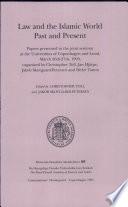
The Application of Islamic Criminal Law in Pakistan
Sharia in Practice
No legal system in the world has aroused as much public interest as Sharia. However, the discourse around Sharia law is largely focussed on its development and the theories, principles and rules that inform it. Less attention has been given to studying the consequences of its operation, particularly in the area of Islamic criminal law. Even fewer studies explore the actual practice of Islamic criminal law in contemporary societies. This book aims to fill these gaps in our understanding of Sharia law in practice. It deals specifically with the consequences of enforcing Islamic criminal law in Pakistan, providing an in-depth and critical analysis of the application of the Islamic law of Qisas and Diyat (retribution and blood money) in the Muslim world today. The empirical evidence adduced more broadly demonstrates the complications of applying traditional Sharia in a modern state.
- ISBN 13 : 9004172254
- ISBN 10 : 9789004172258
- Judul : The Application of Islamic Criminal Law in Pakistan
- Sub Judul : Sharia in Practice
- Pengarang : Tahir Wasti,
- Kategori : Religion
- Penerbit : BRILL
- Bahasa : en
- Tahun : 2009
- Halaman : 429
- Google Book : http://books.google.co.id/books?id=88-XutlkJAQC&dq=intitle:Islamic+Criminal+Law&hl=&source=gbs_api
-
Ketersediaan :
Even fewer studies explore the actual practice of Islamic criminal law in contemporary societies. This book aims to fill these gaps in our understanding of Sharia law in practice.









